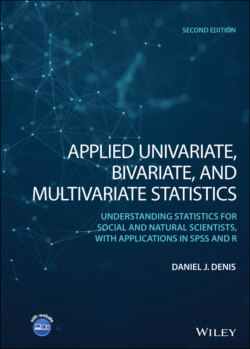Читать книгу Applied Univariate, Bivariate, and Multivariate Statistics - Daniel J. Denis - Страница 13
1.1 THE PHILOSOPHICAL BASES OF KNOWLEDGE: RATIONALISTIC VERSUS EMPIRICIST PURSUITS
ОглавлениеAll knowledge can be said to be based on fundamental philosophical assumptions, and hence empirical knowledge derived from the sciences is no different. There have, historically, been two means by which knowledge is thought to be attained. The rationalist derives knowledge primarily from mental, cognitive pursuits. In this sense, “real objects” are those originating from the mind via reasoning and the like, rather than obtained empirically. The empiricist, on the other hand, derives knowledge from experience, that is, one might crudely say, “objective” reality. To the empiricist, knowledge is in the form of tangible objects in the “real world.”
Ideally, science should possess a healthy blend of both perspectives. On the one hand, science should, of course, be grounded in objective objects. The objects one studies should be independent of the psychical realm. A cup of coffee is a cup of coffee regardless of our belief or theory about the existence of the cup. On the other hand, void of any rationalist activity, science becomes the study of objects for which we are not allowed to assign meaning. For example, the behavior of a pigeon in a Skinner box11(see Figure 1.1) can be documented as to the number of times it presses on the lever for the reward of a food pellet. That the pigeon presses on the lever is empirical reality. Why the pigeon presses on the level is theoretical speculation, of which there could be many competing possibilities. Observing data is fine, but without theory, we have very little “guidance” to either explain current observations or predict new ones. B.F. Skinner’s theory of operant conditioning, being such that the pigeon presses the lever because it is reinforced to do so, is a prime example of where a wedding of rationalism and empiricism takes place. The theory attempts to explain or account for the pigeon's behavior. It is a narrative for why the pigeon does what it does.
Figure 1.1 Observing the behavior of a pigeon in a Skinner box.
Source: Dtarazona (1998). https://commons.wikimedia.org/wiki/File:UNMSM_PsiExperimental_1998_2.jpg. Public Domain.
Of course, theorizing can go too far, much too far. One must be cautious to not “over‐theorize” too emphatically without acknowledging the absence of empirical backing. Is there anything wrong with hypothesizing that cloudy days are associated with depressive moods? No, so long as you are prepared to state what evidence exists that may support or contradict your theory. If no evidence exists, you may still theorize, but you owe it to your audience to admit the lack of current empirical support for your hypothesis.
As an example of “heightened theorizing,” recall the missing Malaysia Airlines Flight 370 where a Being 777 aircraft vanished, apparently without a trace, originally destined from Kuala Lumpur to Beijing in March of 2014. Media were sometimes criticized for proposing numerous theories as to its disappearance, ranging from the plane being flown into a hidden location to it being hijacked or a result of pilot suicide. One theory even speculated that the plane was swallowed by a black hole! Speculation is fine and theorizing is a necessary scientific as well as human activity, so long as one is up front about existent available evidence to support the theory one is advancing. Indeed, one could assign probabilities to competing theories and revise such probabilities as new data become available. This is precisely what Bayesian philosophers and statisticians are wont to do. A theory should only be considered credible however when empirical reality and the theory coincide (see Figure 1.2). The fit may not be perfect, and seldom if ever is, but when the rational coincides well with the empirical, credibility of the idea is at least tentatively assured, at least until potentially new evidence debunks it (e.g., the fall of Newtonian physics).
Figure 1.2 “Model fit” as an overlap of data with theory.
We must also ensure that our theories are not too convenient of narratives fit to data. If you have ever witnessed a sporting event where the deciding point occurred by the lucky bounce of a puck in hockey or the breezy push of a tennis ball in midair, only to hear post‐match commentators laud the winning team or individual as suddenly so much better than the losing team, then you know what “convenient narratives” are all about. We must be careful not to exaggerate how well our given theory fits data simply because a few data points went “our way.” George Box once said that all models are wrong but some are useful. In any scientific endeavor, guard against falling in love with your theory or otherwise exaggerating it far beyond what the data suggest. Otherwise, it no longer is a legitimate theory, but rather is simply your brand and more a product of subjective bias and “career‐building” than anything scientific. After 20 years of advocating a theory, is the researcher you are speaking to really prepared to “accept” evidence that contradicts his or her theory? They have a lot of stakes in that theory, their whole career may have been built upon it, are they really willing to accept “defeat” of it? Indeed, one reason I believe why economic predictions, for instance, are often looked upon with suspicion, is because economists, like psychologists (and theoretical physicists, for that matter), are far too quick to advance theories as though they were near facts. “Sexy theories” sound great and may be marketable to uncritical consumers and media (make an outlandish claim on cable, you'll be a hero!), but to good scientists, theories are always only as good as the data that exist to support them. Science is exciting, to be sure, but should not be overly speculative. If you are looking for fireworks, then you are best to choose a field other than science.
